
Jal is a pop rock band from Lahore, Punjab, Pakistan. The band originally consisted of songwriter, vocalist and lead guitarist, Goher Mumtaz and vocalist, Atif Aslam and later joined by bass guitarist Omer Nadeem and later Salman Albert joined on drums in 2003. Founded in 2002, they first became popular playing in Lahore's underground music scene with the release of their song "Aadat".
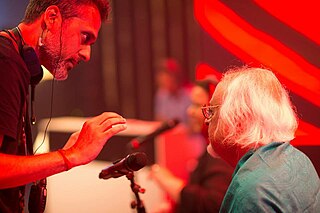
Bilal Maqsood is a Pakistani singer-songwriter, composer, music video director and painter better known for being a founding member of the pop-rock band Strings (1988–2021).

Sarmad Ghafoor is a Pakistani record producer, guitarist, vocalist, and songwriter. He has released two albums, one with Rungg, and one with Qayaas. He has also produced albums for a wide variety of artists, including Atif Aslam, Bilal Khan, Nusrat Hussain, Abbas Ali Khan, and Overload. Sarmad is best known for his work producing two platinum albums for Atif Aslam, including Jal Pari.

Atif Aslam is a Pakistani playback singer, songwriter, composer, and actor. He has recorded many songs in both Pakistan and India, and is known for his vocal belting technique.
Pakistani popular music or shortly Pak-pop music refers to popular music forms in Pakistan. Pakistani pop is a mixture of traditional Pakistani classical music and western influences of jazz, rock and roll, hip hop and disco sung in various languages of Pakistan, including Urdu. The popularity of music is based on the individual sales of a single, viewership of its music video or the singer's album chart positions. Apart from within Pakistan, Pakistani pop music has also achieved an influential following and popularity in neighboring countries and is listened by members of the Pakistani diaspora, especially in the Middle East, Europe and North America.

Faisal Kapadia is a Pakistani musician, composer, singer-songwriter, and a guitarist. He is best known as the lead vocalist and primary lyricist of rock music band Strings. After dissolution of Strings band, he started singing as solo artist. Faisal Kapadia has directed a number of music videos for his band. Strings made its entry into the Bollywood music in 2006.

Duur is the third album by the Pakistani pop band Strings, first released on 21 January 2000 and then re-released on 1 January 2002. Singles from the album were Duur, Anjane, and Aankhain.
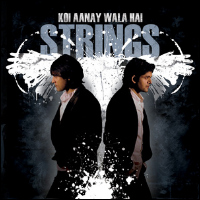
Koi Aanay Wala Hai is the fifth studio album by the Pakistani pop band Strings, released on 16 May 2008.
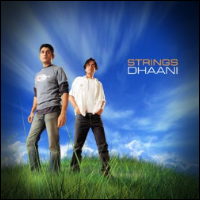
Dhaani was the fourth album by the Pakistani pop band Strings, released in 2003. Singles from the album were "Mera Bichara Yaar", "Soniyae", "Chaaye Chaaye", "Pal", "Bolo Bolo", "Dhaani", "Najane Kyun", "Hai Koi Hum Jaisa" and "Kahani Mohabbat Ki".
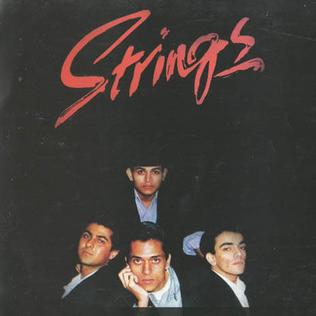
Strings is the debut album of the Pakistani pop band Strings, released in the year 1990. The album was recorded at the EMI Studios in Karachi and was produced by lead guitarist Bilal Maqsood. Singles from the album included "Pyar Se Phir", "Yeh Hai Pyar Ka Saman" and "Jab Se Tum Ko".

Koi Aanay Wala Hai is the fourth single by the pop band Strings from their fifth studio album, Koi Aanay Wala Hai (2008).

Strings was a Pakistani pop/rock band composed of two members, plus four live band members from Karachi, Pakistan. The band was initially formed by four college students—Bilal Maqsood, Faisal Kapadia (vocals), Rafiq Wazir Ali (synthesizer) and Kareem Bashir Bhoy —in 1988. In 1992 the quartet disbanded, only to make a comeback with Maqsood and Kapadia in 2000. While the initial band rode the new wave of Pakistani pop music, the later lineup ushered a revival in the Pakistani music industry.
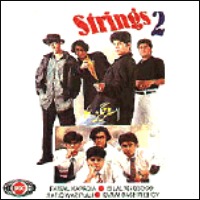
2 is the second studio album by Pakistani pop rock band Strings. Singles from the album included "Sar Kiye Yeh Pahar" and "Aaj Mein Khud He Se".

Bilal Lashari is a Pakistani filmmaker, cinematographer, screenwriter and occasional actor. He made his directorial debut with Waar (2013), which at the time of release became Pakistan's highest-grossing film. His next feature The Legend of Maula Jatt (2022) was a remake of the 1979 film Maula Jatt. The film broke box office records and became Pakistan's highest grossing film. Lashari won awards in four categories at the ARY Film Awards 2014 for his directorial debut. In 2024, he was awarded with the President's Sitara-i-Imtiaz for his contribution towards the Pakistani cinema.
"Aadat" is originally a song by the band Jal. It was sung by Atif Aslam and composed by Goher Mumtaz and Atif Aslam. Later it was released in several different versions in Jal's album Aadat by Farhan Saeed and Atif Aslam's solo album Jal Pari. It was also used in the Bollywood films Kalyug and Chocolate.
Imran Muhammad Akhoond is a Pakistani guitarist and session musician. He is best-known as the lead guitarist in the band of Pakistani pop/rock singer Shehzad Roy. He has performed with various other bands, including Junaid Jamshed, Strings and Vital Signs.

The eighth season of the Pakistani music television series Coke Studio Pakistan premiered on 16 August 2015 and aired its finale on 4 October 2015. It aired a weekly episode every Sunday on various channels across Pakistan. The season was revived under the tagline of The Sound of Nation.

Velo Sound Station is a Pakistani television programme and music show which features live studio-recorded music performances by veteran and emerging artists. The show is directed by Bilal Maqsood and Yasir Jaswal, former is also the executive producer of the show. The first episode of Velo Sound Station aired on 20 November 2020.















